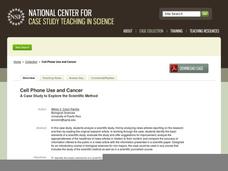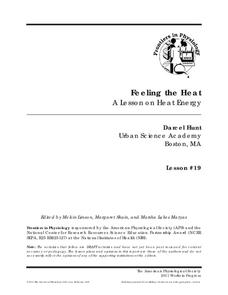Curated OER
Eating Well and Keeping Fit
Students look at statistics that show children who are overweight are increasing in our society. Students chart out ways to be physically active and how to eat a balanced diet. Students devise a menu/activity chart in light of what has...
Curated OER
Breakfast First
Students explore reasons why breakfast is an important meal. In this healthy eating lesson, students research the benefits of eating breakfast and create a cookbook of healthy breakfast items. Students establish a breakfast plan for two...
Curated OER
Roam the Halls for Fitness
Students walk as many steps as possible during a class period while using a digiwalker or pedometer.
Curated OER
Hazard Identification Activity
Students identify the types of hazards in their classrooom. They develop a plan to eliminate as many of them as possible. They practice earthquake drills to be better prepared during an emergency.
Curated OER
Sweet or Unsweet?
This lesson plan challenges students to make their own judgments about the safety of artificial sweeteners after hands-on study and Internet research, and to support those judgments with carefully considered evidence and reasoning.
Florida Department of Health
Nutrition: Developing Healthy Habits Unit
The focus of the fourth unit in the Youth Risk Behavior Survey Curriculum is on healthy eating and exercise. Class members examine healthy habits data from the YRBD Youth Online Tool, learn about the importance of a healthy diet and...
Curated OER
Identifying an Author's Purpose
Students read, "Research Shows TV PSAs Effective In Reducing Teen Marijuana Use", discuss the article with questions imbedded in the lesson and write their own PSA.
American Physiological Society
Hoo Eats Who and What is What in Your Own Backyard?
Bird is the word! Teach life science scholars the importance of our feathered friends and the roles they play in our ecosystem. Using the plan, learners investigate the birds in their areas, determine the biotic and abiotic factors that...
American Physiological Society
Sticky Adaptations A Lesson on Natural Selection
Now you see it, now you don't! The stick bug exhibits the ability to disappear into a wooded environment. Why does this adaptation manifest in some species, but not in others? Life science students explore animal adaptations in nature...
American Physiological Society
Effects of Environment on Enzymes
Much like the tale of Humpty Dumpty, proteins, once altered, will never be the same again. Honors and pre-AP biology classes explore the delicate world of enzymes via a Webquest and lab experiment. The teacher's guide contains all...
Oregon Education Professional Development Commission
The First Days
Designed for first-year teachers, this 116-page packet has it all. Questions you should ask administrators and fellow teachers, a checklist of things to do before school starts, a school-year calendar to record special school events and...
Council for Economic Education
Economic Data Lesson: Economic Policy Options
Can you make decisions that will impact millions of people around the nation? Scholars research the role of the Federal Reserve, and its Chairman, on the economic outlook of the country. They analyze current trends in unemployment,...
Pulitzer Center
Food Insecurity
Food insecurity, whether as a result of food scarcity or a lack of nutritious food, is a growing and serious problem in the world today. After discussing the concept of food insecurity, learners listen to an NPR radio broadcast on the...
National Center for Case Study Teaching in Science
Cell Phone Use and Cancer
The cell phone you're using is making you deaf: news at 11:00. Oftentimes, the media uses fear tactics and other techniques to increase its audience base. In an intriguing look at the difference between scientific journals and...
Curated OER
Fracking: Positive or Negative Impact?
Your teenagers may have heard of fracking, but do they really know what it is? And could they debate the benefits and risks? Educate your environmental science class with a activity about hydraulic fracturing, non-renewable energy...
Council for Economic Education
Inflation Data: Is the Economy Healthy?
What stories do current trends tell about society, fashion, and the future? Scholars investigate the concept of inflation and its impact on the future of the American economy. They compile current economic data to determine the level of...
Bully Free Systems
Bully Free Lesson Plans—11th Grade
It takes courage to stand up to bullies. Two sample lessons from a complete Bully Free curriculum, "Courageous and Brave Bystanders" and "Assertiveness Skills for Bullied Students and Empowered Bystanders" provide participants with...
Bully Free Systems
Bully Free Lesson Plans—12th Grade
Two sample lessons from a curriculum unit on bullying provide high school seniors with an opportunity to assess their online and cell phone behavior and to consider how they can offer support to bullied students. Each plan includes an...
American Physiological Society
How Does the Density of a Liquid Affect the Buoyancy of an Object?
Here's a lesson plan that will really float your boat! Introduce physical science scholars to the relationship between buoyancy and density through an assortment of individual and collaborative exercises. Lab groups work together to...
American Physiological Society
Why is Kettle Corn Cooked in Copper Pots?
The kitchen — it's not just for eating anymore! Specific heat is often a difficult concept to grasp, so give it context by relating it to cooking. Learners gain experience in the principles of thermal energy transfer by designing an...
American Physiological Society
Sit On It
How do product designers come up with the variety of things we see in stores and on TV every day? They identify a need, then create something that meets that need. Sounds simple, right? A two-week lesson puts seventh graders in that role...
American Physiological Society
Feeling the Heat
How do the changing seasons affect the homes where we live? This question is at the forefront of engineering and design projects. Challenge your physical science class to step into the role of an architect to build a model home capable...
ProCon
Prescription Drug Ads
Bayer Pharmaceuticals sold heroin as a cough medicine in the 1900s ... who knew? Scholars discover this, and other interesting facts, when they use the resource to prepare for a class discussion or debate. They browse videos, readers'...
Curated OER
Quinoa Pasta 3
A mixture of quinoa and corn is for dinner in this collaborative task that sets up nicely as a system of linear equations. Your supper guests discuss numerical precision and percentages as they formulate a plan of how to solve the problem.

























